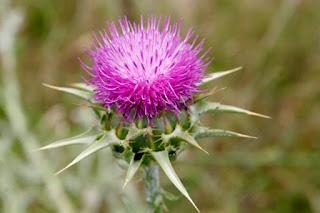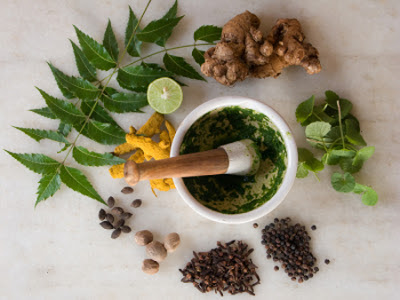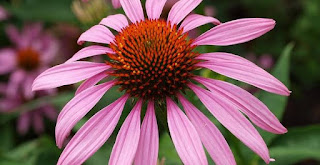Herbs play a vital role in maintaining our health. The medical benefits of herbs are well documented and they have been used to provide remedies to ailments for thousands of years. Today scientists are continuing to discover new medical uses for herbs.
They can be used to provide specific remedies for certain complaints as well as preventing diseases such as cancer, heart disease and Alzheimer's, as well as prolong health and slow ageing. There is a herbal remedy for almost everything, whether it is to provide a natural solution to a headache/stress, boost the immune system, improve the health of your liver or to help promote sleep.
Herbs contain vitamins, minerals and antioxidants. Antioxidants help to neutralise dangerous free radicals that are present in our bodies and can destroy healthy cells. Ensuring we eat plenty of food with antioxidants to reduce the effect of these free radicals damaging our cells.
The antioxidant compounds found in herbs occur as phenols, polyphenols and flavonoids. The density and ratio of these compounds gives herbs their medical effects for the treatment of certain ailments. We can keep ourselves healthier and younger looking by eating herbs as part of a balanced diet.
Herbal extracts are widely available for us to use in many forms and can be dispensed as tablets, ointments, oils, infusions, extracts, teas, compresses, bath preparations and gargles.
Echinacea (Echinacea)
Echinacea is a plant native to North American plant. Commonly known as purple cornflower, the Echinacea plant gets its name from the small spines in the centre of the flower.
All parts of the plant are used, including the root, leaves, flowers and seeds. Echinacea is used as a tool for fighting viruses and keeping the immune system healthy. It can improve the function of disease-fighting immune cells and can offer resistance to colds and flu by boosting the immune system.
Garlic (Allium sativum)
Garlic belongs to the Allium family which includes onions, chives, shallots and leeks. The active compound in garlic is allicin, a powerful antibiotic which helps the body to inhibit the ability of germs to grow and reproduce.
Garlic promotes the well-being of the heart and immune system with its antioxidant properties. It also helps to maintain healthy blood circulation.
Ginkgo (Ginkgo biloba)
Ginkgo is known as the maidenhair tree and is one of the oldest living trees.
Ginkgo is mainly used as memory and concentration enhancer. It has been proven to increase blood circulation (especially to the brain), and can increase mood, mental alertness, memory, and overall stamina.
St. John's Wort (Hypericum perforatum)
St Johns wort is a perennial herb recognized by its bright yellow-coloured flowers.
It inhibits the reuptake of certain neurotransmitters and is used to treat mild depression, anxiety and sleep disorders.
Milk Thistle (Silybum marianum)

This perennial thistle is native to Southern Europe/Asia. It has red/purple flowers and pale green leaves with white veins.
The seeds are the medicinal parts of the plant and the extract, silymarin, is used in medicine. Milk thistle is believed to give some remedy for liver diseases. Its antioxidants benefit the liver and help the body eliminate toxins. It has been used to treat cirrhosis of the liver and liver disease caused by alcohol.
Chamomile (Chamomile)
This daisy like plant is a member of the Asteraceae family. Often used as a fragrant alternative to a lawn, the herb chamomile is perhaps most recognised in its form as chamomile tea.
Chamomiles daisy like flowers contain volatile oils, flavonoids and other therapeutic substances. Medicinally it is used as a muscle relaxant and antispasmodic, but also has antiseptic and anti-inflammatory capabilities. This herb can remedy an upset stomach and aid sleep.
Thyme (Thymus vulgaris)
This perennial herb is used for both culinary and medical purposes.

The flowers, leaves, and oil are used as medicine. It has mild antiseptic, antispasmodic, tonic and carminative qualities and is often used to ease sore throats and coughs.
Sage (Salvia officinalis)
Salvia is a member of the mint family Lamiaceae, which includes many other herbs. This perennial, evergreen herb is native to the Mediterranean. It has woody stems and greyish leaves, with blue to purplish flowers. It is often grown for both medicinal and culinary use, as well as being grown as a ornamental garden plant.
Sage is used to calm the nerves, improve digestion and ease lung congestion and coughs.
Rosemary (Rosmarinus officinalis)
This perennial herb has fragrant, evergreen needle-like leaves and white, pink, purple, or blue flowers. It is native to the Mediterranean region and a member of the Lamiaceae family.
It is used medically to aid memory, improve circulation, eliminate toxins from the body, ease joint and headache pain and relieve cold symptoms.
Peppermint (Mentha × piperita)
This herb is another member of the mint family, Lamiacae. Plants in the mint family are very hardy perennials with vigorous growth habits.
Peppermint is often used for flavouring ice cream, confectionery, toothpaste and chewing gum due to its high menthol content. It is used to ease stomach and digestive problems, as well as having calming properties.
For related articles click onto:
Feeding plants
Growing Garlic in Containers
Growing herbs
Growing herbs on a windowsill
Growing herbs in pots
Herbaceous borders
How to grow garlic
How to grow lavender
How to build a cold frame
How to grow basil
How to grow coriander
How to grow garlic
How to Grow Ginger
How to grow lavender
How to grow mint
How to grow parsley
How to grow parsley
How to grow parsley indoors
How to grow rosemary
How to grow thyme
How to make compost
How to propagate using division
How to propagate from seed
Plants for free
Preparing a seed bed
Potagers
Watering plants
Growing Garlic in Containers
Growing herbs
Growing herbs on a windowsill
Growing herbs in pots
Herbaceous borders
How to grow garlic
How to grow lavender
How to build a cold frame
How to grow basil
How to grow coriander
How to grow garlic
How to Grow Ginger
How to grow lavender
How to grow mint
How to grow parsley
How to grow parsley indoors
How to grow rosemary
How to grow thyme
How to make compost
How to propagate using division
How to propagate from seed
Plants for free
Preparing a seed bed
Potagers
Watering plants





No comments:
Post a Comment